WHO enhances access to basic health care in Yemen
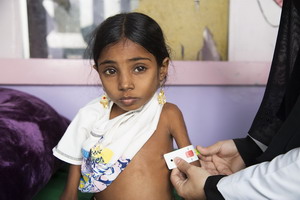 Seven-year-old Afaf travels more than 100 km of difficult roads to receive treatment for severe acute malnutrition17 December 2018 – Afaf, 7, has come to Aslam district to Al Jumhouri Hospital in Hajjah governorate, Yemen, a journey of more than a 100 km over difficult roads, to receive treatment for severe acute malnutrition and other problems.
Seven-year-old Afaf travels more than 100 km of difficult roads to receive treatment for severe acute malnutrition17 December 2018 – Afaf, 7, has come to Aslam district to Al Jumhouri Hospital in Hajjah governorate, Yemen, a journey of more than a 100 km over difficult roads, to receive treatment for severe acute malnutrition and other problems.
“When we have money to seek medical care we take her to the hospital, but when we don’t she must stay at home until she recovers on her own,” said Um Afaf.
In the same hospital is Nabila Yahya. She has come from Al Shaghadira District with her six-week old daughter Amira.
“My husband is ill,” says Nabila, “and cannot find a job. He used to work as a taxi driver but then the price of fuel doubled and he could longer afford it. Now he stays home.”
Amira has been sick since she was born.
“Something is wrong with her throat and she can’t breastfeed. She suffered from diarrhoea and we took her to the health facility many times. Each time they released her she became ill again and had to be returned for further medical care,” says Amira’s mother.
“She has been in this health facility for a week now. She was admitted as an inpatient and they are treating her well.”
Around 50% of hospitals and health facilities in Yemen are either not working or functioning partially. People in many areas have to travel long distances in order to access basic health care.
To enhance access to health care for people who would otherwise have to travel hundreds of kilometres to receive treatment WHO and health partners support the Minimum Service Package (MSP) which focuses on eight priority health care services, targeting health facilities at the district level.
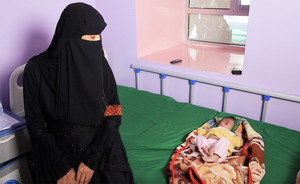 Nabila Yahya at Al Jumhouri Hospital with her six week old daughter AmiraThe MSP touches the lives of over 6.5 million Yemenis. It supports an estimated 125 health facilities and more than 2600 health care workers across the country. As MSP continues to expand, the hope is that more men, women and children will be treated.
Nabila Yahya at Al Jumhouri Hospital with her six week old daughter AmiraThe MSP touches the lives of over 6.5 million Yemenis. It supports an estimated 125 health facilities and more than 2600 health care workers across the country. As MSP continues to expand, the hope is that more men, women and children will be treated.
Economic collapse, poverty and a lack of services have left a great many people vulnerable. They must struggle to survive, often in communities that have little awareness of health and preventive practices.
Ismail Mohammed lies in his mother’s arms in an MSP supported health facility in Al Mahabisha District of Hajjah Governorate. He bled heavily following his circumcision and is severely malnourished.
“Every time he used to breastfeed he would get diarrhoea. So we brought him to this health facility where he was tested. They said he had infections and provided him with therapeutic milk,” says Ismail’s mother.
Access to health care for all
Six-month old Yousra was brought to the MSP supported Al Shaheed Hospital in Khairan Al Muharaq. Severely malnourished and excruciatingly frail – she weighs just 3 kilograms – she cries constantly. Her father sits on the hospital floor with his second child next to him while his wife speaks to the doctor. They both seem disoriented and unsure what is wrong with their child.
“She has had a fever for over three weeks. Yousra’s father is unemployed and we have nothing and no one to support us,” says Yousra’s mother.
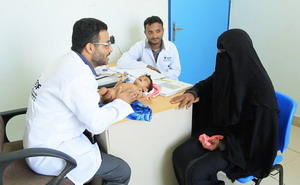 Six month old Yousra weighs 3 kg. She arrived at Al Shaheed hospital severely malnourishedAl Shaheed hospital’s Dr Ali Al Ashwal says severe acute malnutrition with medical complications, as well as communicable diseases, are spreading in communities.
Six month old Yousra weighs 3 kg. She arrived at Al Shaheed hospital severely malnourishedAl Shaheed hospital’s Dr Ali Al Ashwal says severe acute malnutrition with medical complications, as well as communicable diseases, are spreading in communities.
“Due to lack of resources and poverty families like Yousra’s are forced to use whatever means they can find to feed their children,” he says.
Yousra has been fed goat milk since birth. Dr Ali advises her parents she needs to be admitted for at least two weeks. She will be referred to Abs Health Centre where capacity for inpatients is available. It is an hour away from Al Shaheed hospital.
“We lack a therapeutic feeding centre with inpatient capacity here though we hope to be able to provide one soon.”
MSP provides essential services in health centres, covering nutrition, noncommunicable diseases and environmental health, trauma care, childcare, reproductive, maternal, newborn and child health. It aims to provide access to health care at all levels, targeting priority health needs and recalibrating an unbalanced health system.
With the generous support of our donors, including the World Bank, the Office of U.S. Foreign Disaster Assistance, Saudi Arabia, United Arab Emirates, Germany, Italy, Japan, EU Humanitarian Aid (ECHO), and Kuwait, we are working to ensure universal health coverage becomes a reality.
Leukaemia patients in Yemen suffer in silence amid war
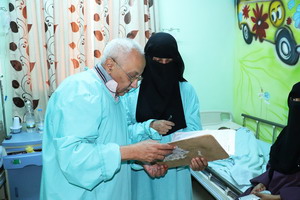 Dr Abdulrahman Al-Hadi faces a sad reality daily, one that reflects the overall situation in Yemen. “Some patients die because life-saving medications are unavailable at the Centre. Some medications cost US$ 100 or more and people don’t have even a fraction of that amount” (Photo: WHO/Sadeq Al-Wesabi).20 November 2018 – Millions are living through the worst humanitarian crises in the world. In a world where basic infrastructure and services are a presumed part of daily life, Yemeni citizens struggle to meet simple needs of access to clean water, sanitation, food and primary health care. The energy formerly spent on development and capacity-building is being wasted on struggling to stay alive and healthy.
Dr Abdulrahman Al-Hadi faces a sad reality daily, one that reflects the overall situation in Yemen. “Some patients die because life-saving medications are unavailable at the Centre. Some medications cost US$ 100 or more and people don’t have even a fraction of that amount” (Photo: WHO/Sadeq Al-Wesabi).20 November 2018 – Millions are living through the worst humanitarian crises in the world. In a world where basic infrastructure and services are a presumed part of daily life, Yemeni citizens struggle to meet simple needs of access to clean water, sanitation, food and primary health care. The energy formerly spent on development and capacity-building is being wasted on struggling to stay alive and healthy.
Almost four years of war has pushed an already weak health system to near ruin. People with chronic illnesses are struggling more than ever before to access treatment. The current situation forces 35 000 cancer patients – and nearly 11 000 new cases are diagnosed yearly – to hope only to survive rather than thrive. Almost half of the hospitals and health facilities have been destroyed due to the war, leaving the health system teetering on the brink of collapse.
The Leukaemia Centre in Sana’a is the only specialized leukaemia treatment centre for children in Yemen. With zero government support the Centre is in dire need of supplies and what is available covers only a fraction of the needs of incoming patients.
Tamir Abdulqader from Al Hudaydah governorate is seven years old and is one of three siblings. Pain in his joints three months ago prompted his mother to seek medical advice; unfortunately, he was misdiagnosed until he came to the Leukaemia Centre in Sana’a where he is currently receiving proper treatment. Tamir’s mother who accompanies him does not have anyone to support her, including her husband. “Once he learned about Tamir’s diagnosis, he told me that he is dead to him. We are divorced now and I don’t have anyone to help me” she says. Not only is she in debt after being forced to move to Sana’a for treatment, her two other children have been left with their grandmother in Al Hudaydah, who has been forced to sell her belongings just to make ends meet.
Poverty, vulnerability, and lack of supplies
Being the only specialized centre in Yemen, there is a great deal of pressure placed on the Leukaemia Centre that it is not equipped to take on. The sheer number of patients coming in from all governorates exceeds the available capacity and medical supplies. “Many patients coming in can’t afford to buy even the basic supplies such as an IV or cough medicine” says Dr Abdulrahman Al Hady, Director of the centre in Sana’a.
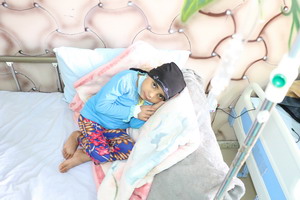 The Leukaemia Centre continues to receive patients from all over the country in significantly rising numbers, while severely lacking supplies and medication. (Photo: WHO/Sadeq Al-Wesabi).
The Leukaemia Centre continues to receive patients from all over the country in significantly rising numbers, while severely lacking supplies and medication. (Photo: WHO/Sadeq Al-Wesabi).
Shaima, seven, sits in the other room with her mother who accompanies her. In a pink headscarf, her tired little face seems even smaller, though her eyes still shine with the light of hope. She was diagnosed with leukaemia a few months ago after being in a car accident that injured her foot. “She was very scared and had a persistent fever for a few days after the accident. Her joints started to hurt her and that’s when I took her to the hospital,” says Shaima’s mother.
She tried two hospitals that rejected her admission before being admitted into the Leukaemia Centre. “We don’t have a place to stay, so we move around and stay with relatives whenever we can.”
With 22.2 million requiring humanitarian assistance, those with chronic diseases fall through the cracks
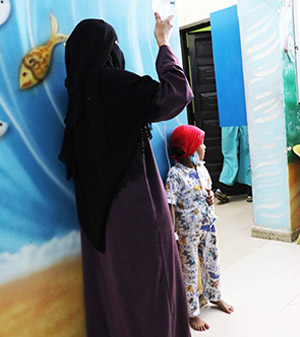 Shaima was diagnosed with leukaemia a few months ago after being in a car accident that injured her foot. Her family tried two hospitals that rejected her admission before being admitted into the Centre. (Photo: WHO/Sadeq Al-Wesabi).Many families of patients suffering from chronic diseases face devastating circumstances and struggles in their plight to access medical care. Poverty, lack of resources and medical care is common to millions of Yemeni people. About 75% – some 22.2 million people – require humanitarian or protection assistance, and more than half of them (11.3 million) require acute assistance, an increase of 1 million since July 2017.
Shaima was diagnosed with leukaemia a few months ago after being in a car accident that injured her foot. Her family tried two hospitals that rejected her admission before being admitted into the Centre. (Photo: WHO/Sadeq Al-Wesabi).Many families of patients suffering from chronic diseases face devastating circumstances and struggles in their plight to access medical care. Poverty, lack of resources and medical care is common to millions of Yemeni people. About 75% – some 22.2 million people – require humanitarian or protection assistance, and more than half of them (11.3 million) require acute assistance, an increase of 1 million since July 2017.
The Leukaemia Centre continues to receive patients from all over the country in significantly rising numbers, while severely lacking supplies and medication. Only 20% or less of their needs are covered, and the death rate is higher than ever. “Sometimes incoming patients can’t afford to purchase the supplies that are not covered by the Centre, and out of compassion, doctors purchase these supplies themselves to assist those patients” Dr Abdulrahman adds. With the exchange rate of the US dollar increasing dramatically, prices of medication have sky-rocketed, tripling in price while most of the population struggle to put food on the table.
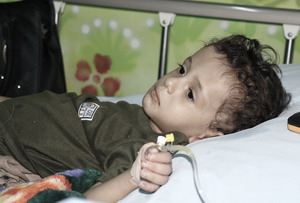 Many families of patients suffering from chronic diseases, like Hussein, face devastating circumstances and struggles in their plight to access medical care (Photo: WHO/Sadeq Al-Wesabi).Hashed is six years old and has been sick for five months now. He sits on the hospital bed and his eyes are fixed on a very small TV screen on the wall playing children’s songs, his energy drained by his disease. His mother had to move to Sana’a from Ibb governorate with her thee children to seek treatment for Hashed. “He started experiencing pain in his legs. They became stiff which prevented him from walking,” says Hashed’s mother. After Hashed’s diagnosis they were advised to travel abroad for treatment that wasn’t available in the country, but they couldn’t afford the expense.
Many families of patients suffering from chronic diseases, like Hussein, face devastating circumstances and struggles in their plight to access medical care (Photo: WHO/Sadeq Al-Wesabi).Hashed is six years old and has been sick for five months now. He sits on the hospital bed and his eyes are fixed on a very small TV screen on the wall playing children’s songs, his energy drained by his disease. His mother had to move to Sana’a from Ibb governorate with her thee children to seek treatment for Hashed. “He started experiencing pain in his legs. They became stiff which prevented him from walking,” says Hashed’s mother. After Hashed’s diagnosis they were advised to travel abroad for treatment that wasn’t available in the country, but they couldn’t afford the expense.
“We can hardly afford the medication prescribed here. We have to buy the cheaper brands because the good ones are very expensive,” she adds.
Dr Abdulrahman faces a sad reality daily, one that reflects the overall situation in Yemen. “Some patients die because life-saving medications are unavailable at the Centre. Some medications cost US$ 100 or more and people don’t have even a fraction of that amount.”
To add to this dire situation, health workers continue to work tirelessly for hours on end without a salary, thereby unable to provide for their own families.
WHO continues to support the National Oncology Centre in Sana’a and its branches in all governorates with various essential and life-saving anti-cancer medicines and chemotherapy medication. This medication is sufficient to cover the acute shortages of medicines for more than 30 000 cancer patients for one year — but this is not enough. More needs to be done or many more people will die from preventable and treatable diseases.
WHO supports district health facilities in Yemen to respond to basic health needs
 It takes Taqiya Ali, 70, 3 hours from her home town of Al Saudah to Azal Health Centre in Sana’a, where she was diagnosed with cholera. During the drive, she experienced severe diarrhoea and vomiting, causing her to faint many times (Photo: WHO/ Hanan Ishaq)7 November 2018 – More than 3 and a half years of war and conflict in Yemen have resulted in widespread devastation and the silent suffering of millions of people. With half of all health facilities closed, access to basic services is limited for Yemenis, resulting in an extremely deteriorated health situation across the country.
It takes Taqiya Ali, 70, 3 hours from her home town of Al Saudah to Azal Health Centre in Sana’a, where she was diagnosed with cholera. During the drive, she experienced severe diarrhoea and vomiting, causing her to faint many times (Photo: WHO/ Hanan Ishaq)7 November 2018 – More than 3 and a half years of war and conflict in Yemen have resulted in widespread devastation and the silent suffering of millions of people. With half of all health facilities closed, access to basic services is limited for Yemenis, resulting in an extremely deteriorated health situation across the country.
Vulnerable communities are forced to travel long distances in order to access basic health care. Due to the precarious economic situation as a result of the conflict, the sick have no choice but to stay at home and face the risk of dying, simply because they cannot afford to pay for transportation to the nearest functional health facility.
Azal Health Centre in Azal District, Sana’a, is supported by WHO through the provision of essential medicines and medical supplies and supporting health workers with financial incentives. The centre is overcrowded with cholera patients of different ages, many of whom have had to travel for hours to reach this facility.
Internally displaced persons from Hudaydah endure harsh circumstances in Sana'a
Dissipated sense of security
With the recent escalation of conflict in the port town of Al-Hudaydah, thousands of people were forced to flee to the capital city Sana’a to escape the insecurity and increasing poverty, malnutrition and disease outbreaks. These displaced people include Yemen’s most vulnerable: the elderly, pregnant women, people who carry the burden of chronic illnesses, and caregivers who bear the responsibility of providing for their children.
Abu Bakr school in Sana’a serves as a transit facility for many displaced families from Al-Hudaydah who have nowhere else to go. Through its partnership with the World Bank under the Emergency Health and Nutrition Project (EHNP), WHO has provided the transit facility with emergency medicines and health supplies for 1000 medical consultations. Support from the Office of US Foreign Disaster Assistance (OFDA) also enabled WHO to provide medicines for 200 patients suffering from hypertension, diabetes and psychosis.
Weighed down by harsh circumstances and forced displacement
Being from Al-Hudaydah, many displaced families are not used to the colder weather in Sana’a and have not yet acclimated to it. Their living space is crowded, with several families often living together in one classroom. Their main concern is the safety and well-being of the children.
Many of the displaced families are headed by women, some of whom are weighed down by old age, chronic illnesses, children to care for, and empty stomachs to feed. Many are sitting on the ground in the schoolyard. They look tired. They have been all been faced with unique circumstances during their displacement, but they all have one thing in common: uncertainty of the future.
There are children playing in the schoolyard, oblivious to the fact that they are far from home. They run around giggling and playing as children usually do. They look joyful, but beneath the surface lingers untold trauma. Memories still seared in their minds, and the perplexing reality they are now forced to live. No child is supposed to face violence of such magnitude at such a tender age, yet displaced children in Yemen experience this daily.
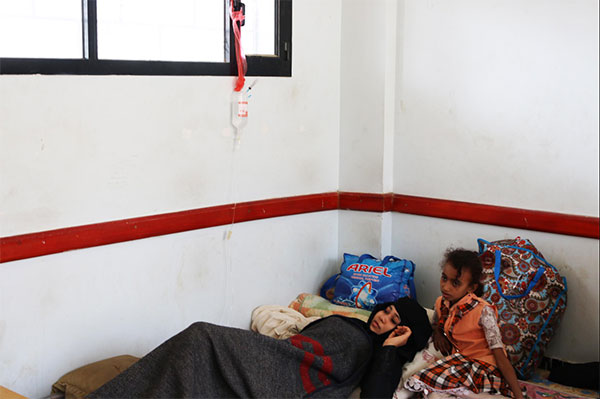 Sama finally got a classroom to rest and take her medication. She has a brain tumor and needs proper medical care she can’t afford. Her medication is provided by charitable donors
Sama finally got a classroom to rest and take her medication. She has a brain tumor and needs proper medical care she can’t afford. Her medication is provided by charitable donors
Sama has been in Abu Bakr school since last June. She had to sleep on the floor before being assigned a classroom. She lays on a thin mattress with a welcoming smile on her face. Her sister and mother are the only family she has got and they have no support. “We ran away with nothing but our purses and the clothes on our backs” Sama’a sister says. Sama needs all the quiet she can get because she suffers from a brain tumour. “She keeps losing consciousness, if not for the help of charitable donors, she wouldn’t be able to get her daily dose of medicine” adds Sama’s mother.
Nada is a mother of four and was displaced from Al Mina district in Al-Hudayah. She took an overcrowded bus to Sana’a. Upon her arrival, she had nowhere to go. Prior to the conflict, Nada had nothing and was hardly able to provide the day to day necessities for her family. “We heard the sounds of aircrafts and missiles hitting the city, and the battle tanks were already in the neighborhoods. I was terrified for my family and I had to leave,” says Nada while describing the situation after the armed conflict had gripped the city.
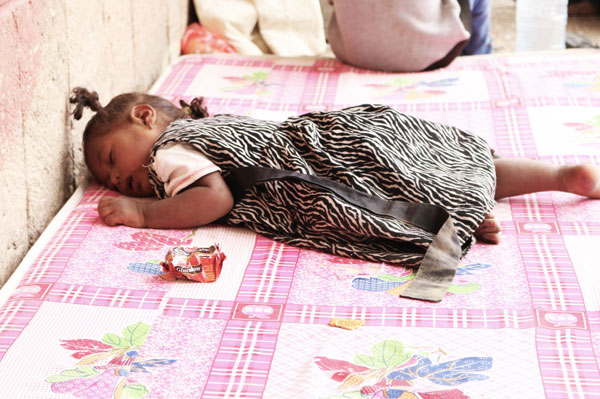 Nada’s daughter is sick and lays on this mattress which she shares with her 3 brothers and sisters and mother. They have to sleep in the school corridor until they get a classroom
Nada’s daughter is sick and lays on this mattress which she shares with her 3 brothers and sisters and mother. They have to sleep in the school corridor until they get a classroom
“Hospitals and pharmacies were closed; people didn’t know where to go. It was a ghost town. All you could hear was the shelling,” She added. Nada does not have a room, so she sits on one of the school corridors where her 2-year-old lies sick on a mattress they all share. “I don’t know what she is sick with, and I can’t afford medical care.”
“We have nothing; we are not part of this. Yet we bear the burdens of this war”
Ahmed fled his home when shelling started in his neighbourhood in Al-Hali district. His fear for the safety of his family of eight forced him to leave everything behind and flee to Sana’a. Khaled arrived in Sana’a with no place to stay. Him and his family were led to AbuBakr school for shelter.
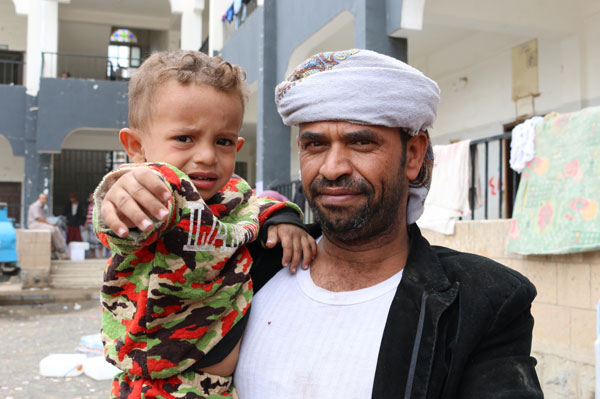 Ahmed fled his home during the shelling in Al Hudaydah in fear for his family’s safety. Arriving in Sana’a, he had no one and didn’t know where to go
Ahmed fled his home during the shelling in Al Hudaydah in fear for his family’s safety. Arriving in Sana’a, he had no one and didn’t know where to go
Murad came with his family and two extended families. “I don’t know how many we are. There are a lot of us.”
In her heavy winter clothes, the youngest in the family – a two month old- is coughing and has a cold. As the weather in the northern city of Sana’a is something they are not used to, the entire family was wearing winter clothes. There is a lot of readjusting for these families to do, and the uncertainty of their situation continues to increase their vulnerability.


